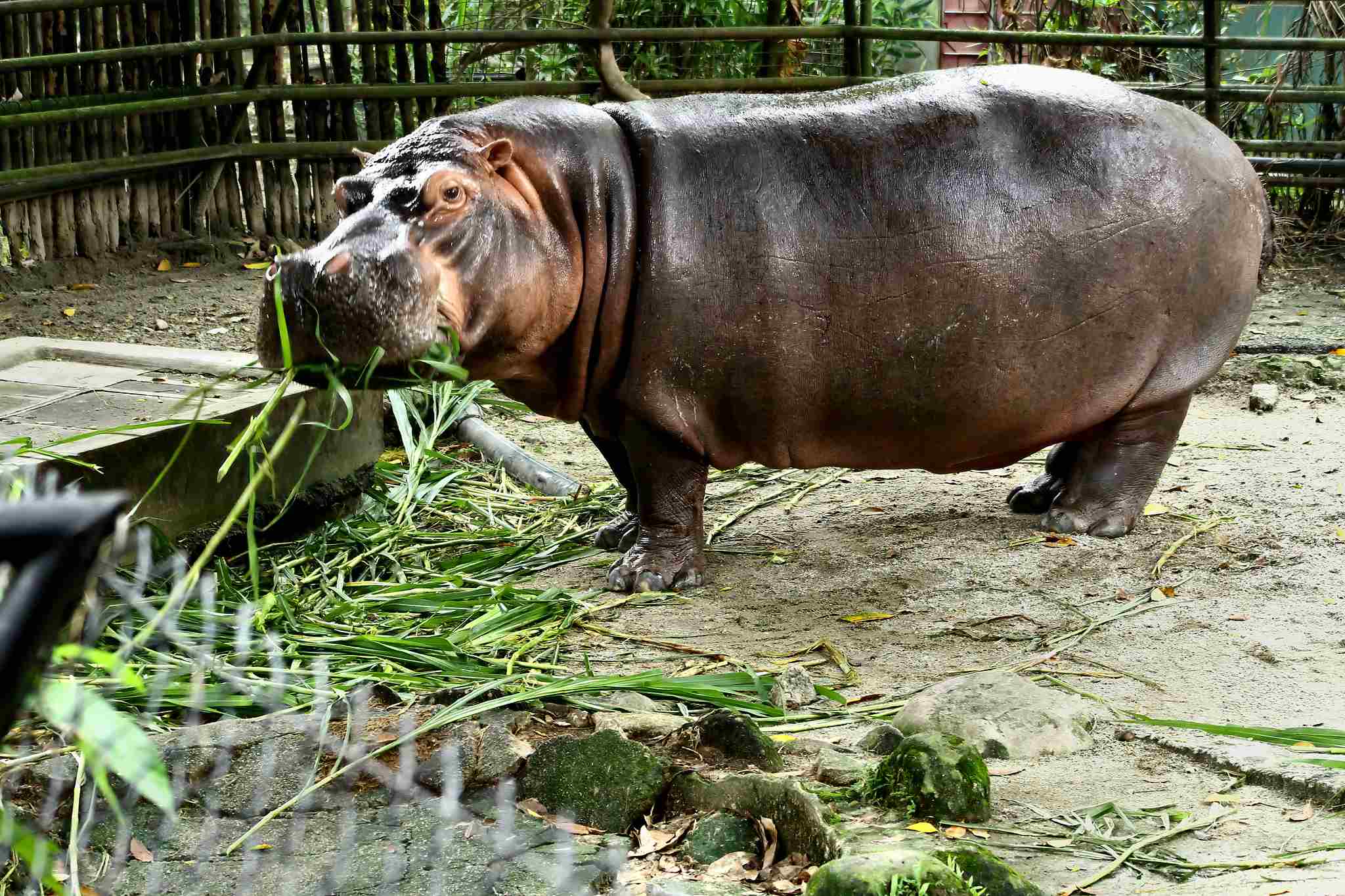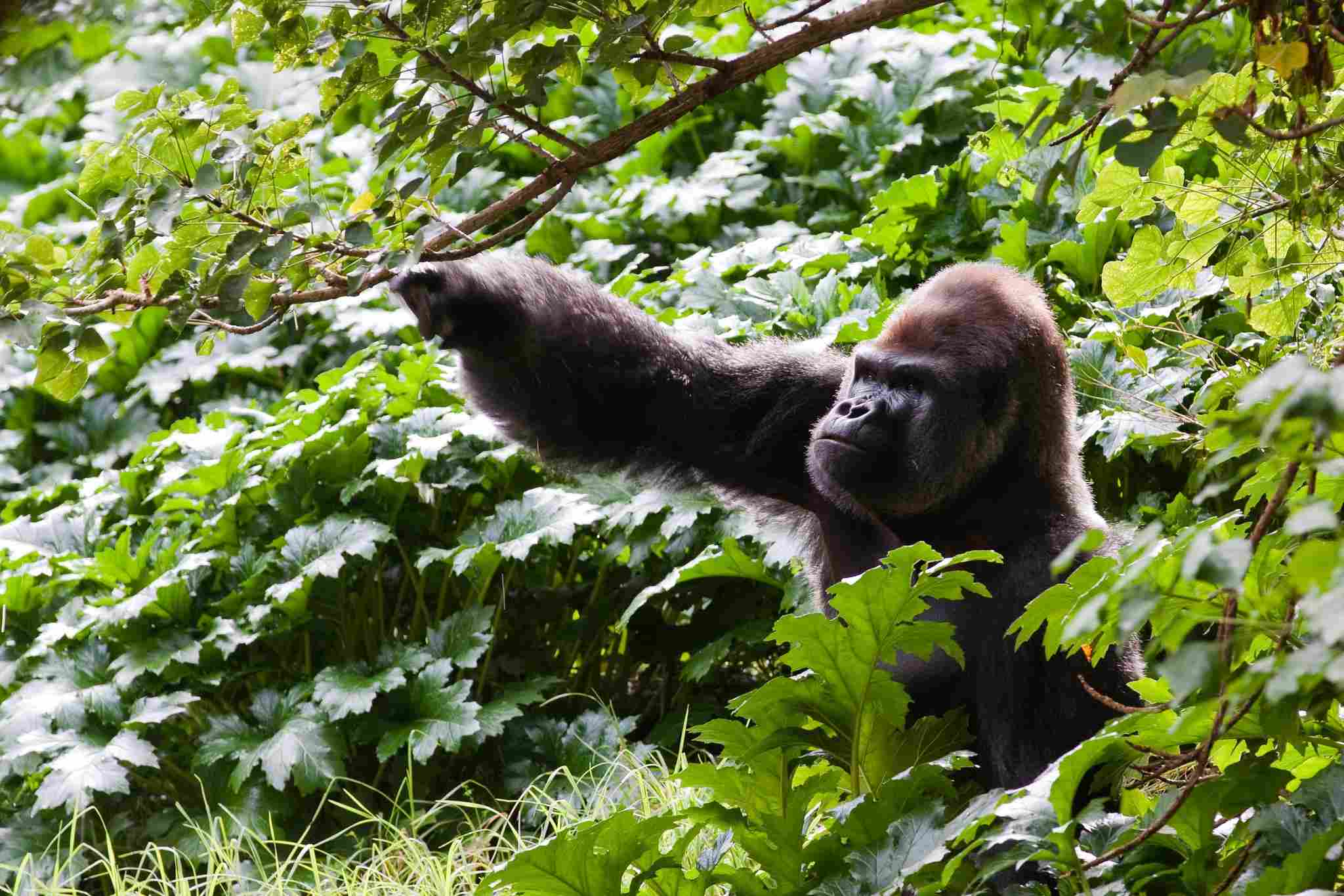Hippo Vs Elephant Size, Weight, Ecological Comparison
The size and weight of an elephant give it a clear advantage over a hippo in a potential confrontation. With its larger size, heavier weight, and longer reach, the elephant would likely overpower and kill the hippo.
However, it’s important to note that the hippo is known for its aggression. In this article, we will explore various factors that can be used to compare these animals and determine which one is stronger.
Key Outcomes
*Biological Comparison
While both the hippo and elephant belong to the animal kingdom, they are not closely related in terms of genus and species. Hippos, scientifically known as Hippopotamus amphibius, belong to the family Hippopotamidae. On the other hand, elephants, scientifically known as Elephas maximus (Asian elephants) and Loxodonta africana (African elephants), belong to the family Elephantidae.
Despite their biological differences, a comparison of these animals reveals some interesting similarities and contrasts. Both hippos and elephants are large, herbivorous mammals, but their sizes and physical characteristics differ significantly. Hippos are known for their stocky bodies, barrel-shaped torsos, and short legs, while elephants have a more elongated body structure with long, sturdy legs.
In terms of weight, elephants are the clear winners. Adult elephants can weigh anywhere from 5,000 to 14,000 pounds, while hippos typically weigh between 3,000 and 4,500 pounds. This significant weight difference is due to the elephants’ larger size and robust build.
*Size and Weight Comparison
When comparing the size and weight of hippos and elephants, it is clear that elephants are the larger of the two. Elephants can reach impressive heights of up to 13 feet at the shoulder, while hippos typically stand around 4 to 5 feet tall. In terms of length, elephants can measure up to 21 feet from trunk to tail, whereas hippos are usually around 10 to 15 feet long.
In addition to their size, elephants also outweigh hippos by a significant margin. Adult elephants can weigh anywhere from 5,000 to 14,000 pounds, depending on the species and gender. On the other hand, hippos typically weigh between 3,000 and 4,500 pounds.
*Physical Capability Comparison
When comparing the physical capabilities of hippos and elephants, it is important to consider various factors such as strength, agility, and defensive mechanisms. While both animals possess unique characteristics that contribute to their survival, they differ in terms of their physical capabilities.
Strength is a key aspect when comparing these two animals. Elephants are known for their immense strength, capable of uprooting trees and carrying heavy loads. With their muscular trunks and powerful tusks, elephants can exert a tremendous amount of force. On the other hand, hippos may not possess the same level of brute strength as elephants, but they are incredibly powerful in their own right. Hippos have strong jaws and can deliver a bite force of up to 1,825 pounds per square inch, making them one of the most formidable animals in the animal kingdom.
In terms of agility, hippos have the advantage. Despite their large size, they are surprisingly agile in water, able to swim swiftly and change direction effortlessly. Elephants, while not as agile in water, make up for it with their ability to navigate through dense forests and rough terrains on land.
When it comes to defensive mechanisms, both animals have their own unique adaptations. Elephants have their massive size and tusks, which they can use to defend themselves against predators. Hippos, on the other hand, have thick, tough skin that acts as armor, protecting them from potential threats.
1). Taxonomy
Hippos belong to the family Hippopotamidae, with the scientific name Hippopotamus amphibius. They are the only extant species in this family. Elephants, on the other hand, belong to the family Elephantidae, with the scientific name Elephas maximus (Asian elephant) and Loxodonta africana (African elephant).
While both hippos and elephants are mammals, they belong to different orders. Hippos are classified under the order Artiodactyla, which includes even-toed ungulates like cows and deer. Elephants, on the other hand, are classified under the order Proboscidea, which is an ancient order that includes extinct species like mammoths and mastodons.
In terms of their biological classification, hippos and elephants are distinct from each other. Hippos are more closely related to cetaceans, which include whales and dolphins, than they are to elephants. This surprising relationship is due to their shared aquatic adaptations and evolutionary history.
2). Appearance
Hippos and elephants have distinct appearances that reflect their unique adaptations and ecological roles. Starting with their coats, hippos have a hairless, thick, and tough skin that is grayish-brown in color.
This skin acts as a protective layer against the sun and helps to retain moisture, allowing hippos to spend extended periods in water without drying out. In contrast, elephants have a rough and wrinkled skin that is gray in color. Their skin is covered in sparse, bristly hairs and is known for its ability to hold water, which helps elephants regulate their body temperature.
In terms of camouflage, hippos have a relatively smooth skin texture that helps them blend in with their aquatic environment. This adaptation allows them to remain inconspicuous while submerged in water, making it easier for them to ambush prey or escape from predators. Elephants, on the other hand, do not rely on camouflage for protection. Their large size and distinctive shape make them easily recognizable in their habitats, and their social structure and defensive behaviors provide them with protection against potential threats.
When it comes to stature and build, hippos are known for their robust and barrel-shaped bodies, with short legs and a large head. They have a streamlined shape that allows them to move through water with ease. Elephants, on the other hand, have a massive and bulky build, with long legs and a long trunk. Their body shape is adapted for supporting their immense weight and foraging on vegetation at higher levels.
3). Size
When comparing the size of hippos and elephants, it is important to consider their total body length and height at the shoulders. Hippos typically measure around 10 to 15 feet in length and stand at a height of about 4 to 5 feet at the shoulders. On the other hand, elephants are much larger in size, with an average total body length ranging from 18 to 24 feet and a shoulder height of 8 to 13 feet.
Hippos may seem relatively small compared to elephants, but they are still formidable creatures. Their compact and muscular bodies allow them to navigate through water with agility and speed. In contrast, elephants’ massive size and elongated bodies make them one of the largest land animals on Earth. Their long legs and trunk contribute to their impressive stature and enable them to reach vegetation at higher levels.
The size difference between hippos and elephants is not only evident in their length and height but also in their overall body mass. Elephants can weigh anywhere from 5,000 to 14,000 pounds, while hippos typically weigh between 3,000 and 4,500 pounds. This significant weight disparity is a result of elephants’ larger size and their need to support their immense bodies.
4). Weight
When comparing the weight of hippos and elephants, it becomes evident that elephants outweigh hippos significantly. Elephants are known for their immense size and can weigh anywhere from 5,000 to 14,000 pounds. In contrast, hippos typically weigh between 3,000 and 4,500 pounds. This weight difference is a result of elephants’ larger size and their need to support their massive bodies.
The weight of an animal plays a crucial role in its overall physical capabilities and ecological niche. Elephants, with their heavy bodies, have adapted to a herbivorous diet that requires them to consume large quantities of vegetation to sustain their energy needs. Their weight also contributes to their ability to uproot trees and clear paths through dense vegetation.
On the other hand, hippos may not be as heavy as elephants, but their weight is still substantial. Their compact and muscular bodies allow them to move swiftly through water, making them one of the fastest aquatic mammals. Their weight also provides them with stability and helps them defend their territory against potential threats.
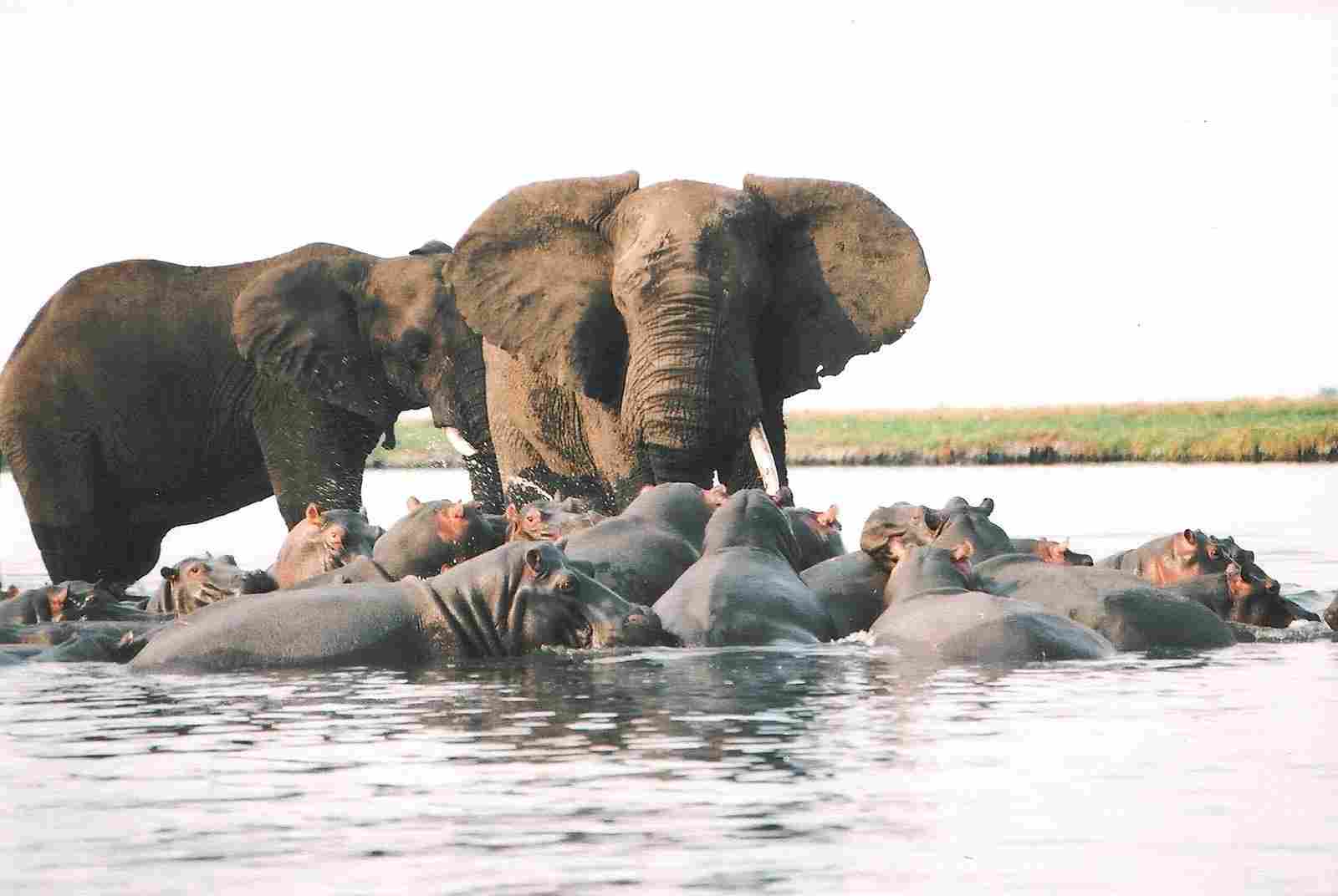
5). Bite Force
Hippos have incredibly powerful jaws, capable of exerting a bite force of up to 1,825 pounds per square inch (psi). This impressive bite force allows them to crush and tear through tough vegetation, as well as defend themselves against predators or rivals.
On the other hand, elephants have a different type of bite force. While they do not possess the same crushing power as hippos, elephants have a specialized set of teeth known as tusks. These elongated incisors can grow up to several feet long and are primarily used for digging, lifting objects, and stripping bark from trees. Although elephants can deliver a forceful bite, their tusks are not designed for the same type of crushing power as hippos.
6). Overall Physical Capacity (Which is Stronger?)
On average, elephants are far larger, heavier and stronger than hippos, and will overpower them in a confrontation. However, specific cases may have different outcomes.
In terms of size and weight, elephants clearly have the advantage. They are the largest land animals, with males weighing up to 12,000 pounds. Their sheer size and bulk provide them with immense power and stability. On the other hand, hippos are smaller in comparison, with males weighing around 3,500 pounds. Despite their smaller size, hippos are known for their aggressive nature and can be formidable opponents.
When it comes to physical capabilities, hippos have incredibly powerful jaws and a bite force of up to 1,825 psi. This allows them to crush and tear through tough vegetation and defend themselves against predators. Elephants, on the other hand, have tusks that can be used for digging, lifting objects, and stripping bark from trees. While they can deliver a forceful bite, their tusks are not designed for the same type of crushing power as hippos.
7). Habitat
Hippos are primarily found in sub-Saharan Africa, where they inhabit rivers, lakes, and swamps. They are semi-aquatic animals and spend a significant amount of time in water to keep their bodies cool and protected from the sun. Hippos are well adapted to their aquatic habitat, with webbed feet and a streamlined body that allows them to move swiftly through the water. They are also known to create wallows, which are depressions in the ground filled with water, where they rest and cool off during the day.
Elephants, on the other hand, have a much wider geographic range. They can be found in various habitats across Africa and Asia, including savannas, forests, and grasslands. Elephants are highly adaptable and can survive in both arid and humid environments. They are known to migrate in search of food and water, and their large size allows them to access resources that other animals cannot reach. Elephants also play a crucial role in shaping their habitat, as they create clearings in forests and disperse seeds through their dung.
8). Lifespan
Hippos have an average lifespan of around 40 to 50 years in the wild, although some individuals have been known to live up to 60 years. On the other hand, elephants have a longer lifespan, with an average of 60 to 70 years in the wild. However, there have been reports of elephants living well into their 80s and even 90s.
The lifespan of both hippos and elephants is influenced by various factors, including genetics, habitat quality, and human impacts. Hippos, being semi-aquatic animals, face threats such as habitat loss, poaching, and conflicts with humans, which can impact their lifespan. Elephants, on the other hand, face similar threats but also have the added pressure of ivory poaching, which has significantly reduced their populations in some areas.
9). Behavior
When comparing the behavior of hippos and elephants, several key aspects come into play: feeding, aggression, vocalization, social behavior, and parenting.
In terms of feeding, both hippos and elephants have distinct dietary preferences. Hippos are herbivores, primarily feeding on grasses and aquatic plants. On the other hand, elephants are also herbivores but have a more varied diet, consuming a wide range of vegetation including leaves, bark, fruits, and even tree branches.
Aggression is another behavior that differs between the two animals. Hippos are known to be highly territorial and can display aggressive behavior, especially during mating season or when protecting their young. Elephants, while generally peaceful, can also exhibit aggression, particularly when they feel threatened or when competing for resources such as water or food.
Vocalization is an important aspect of communication for both hippos and elephants. Hippos produce a variety of vocalizations, including grunts, roars, and honks, which they use to communicate with each other. Elephants, on the other hand, are known for their trumpeting calls, which can carry over long distances and serve as a means of communication within their social groups.
Social behavior is another area where hippos and elephants differ. Hippos are generally solitary animals, although they can form small groups in areas with abundant resources. Elephants, on the other hand, are highly social animals that live in complex family groups led by a matriarch. These groups consist of related females and their offspring, and they engage in cooperative behaviors such as caring for young and protecting each other.

10). Reproduction
Hippos are viviparous, meaning they give birth to live young. The gestation period for hippos is around 8 months, and typically, a single calf is born. The female hippo will usually isolate herself from the herd to give birth and will nurse and care for her calf for several months before it becomes independent. This reproductive strategy allows hippos to ensure the survival and well-being of their offspring.
On the other hand, elephants are also viviparous and give birth to live young. The gestation period for elephants is much longer, lasting approximately 22 months. Elephants usually give birth to a single calf, although twins can occur but are rare. The female elephant will also isolate herself from the herd to give birth and will provide extensive care and protection to her calf. The bond between mother and calf is strong, and the calf relies on its mother for nourishment and guidance for several years.
11). Danger Posed to Humans
When it comes to the danger posed to humans, both hippos and elephants can be potentially dangerous if encountered in the wrong circumstances. However, hippos are far more dangerous than elephants as they are highly aggressive and territorial.
Hippos are known to come close to human settlements, especially when their natural habitats are encroached upon. While they may seem docile, hippos are actually responsible for more human deaths in Africa than any other large animal. They can be extremely territorial and aggressive, especially when they feel threatened or when protecting their young. If you encounter a hippo, it is important to keep a safe distance and avoid any sudden movements that may provoke an attack.
Similarly, elephants can also pose a danger to humans, particularly when they feel threatened or when their young are in danger. While they are generally peaceful animals, they can become aggressive if they perceive a threat. It is important to give elephants their space and avoid any actions that may provoke them. If you encounter an elephant, it is best to stay calm, keep a safe distance, and slowly back away.
In terms of the rate of human deaths caused, hippos are responsible for more fatalities compared to elephants. However, it is crucial to remember that both animals should be treated with caution and respect.
To ensure safety when encountering these animals, it is advisable to follow local guidelines and regulations, and to always be aware of your surroundings.
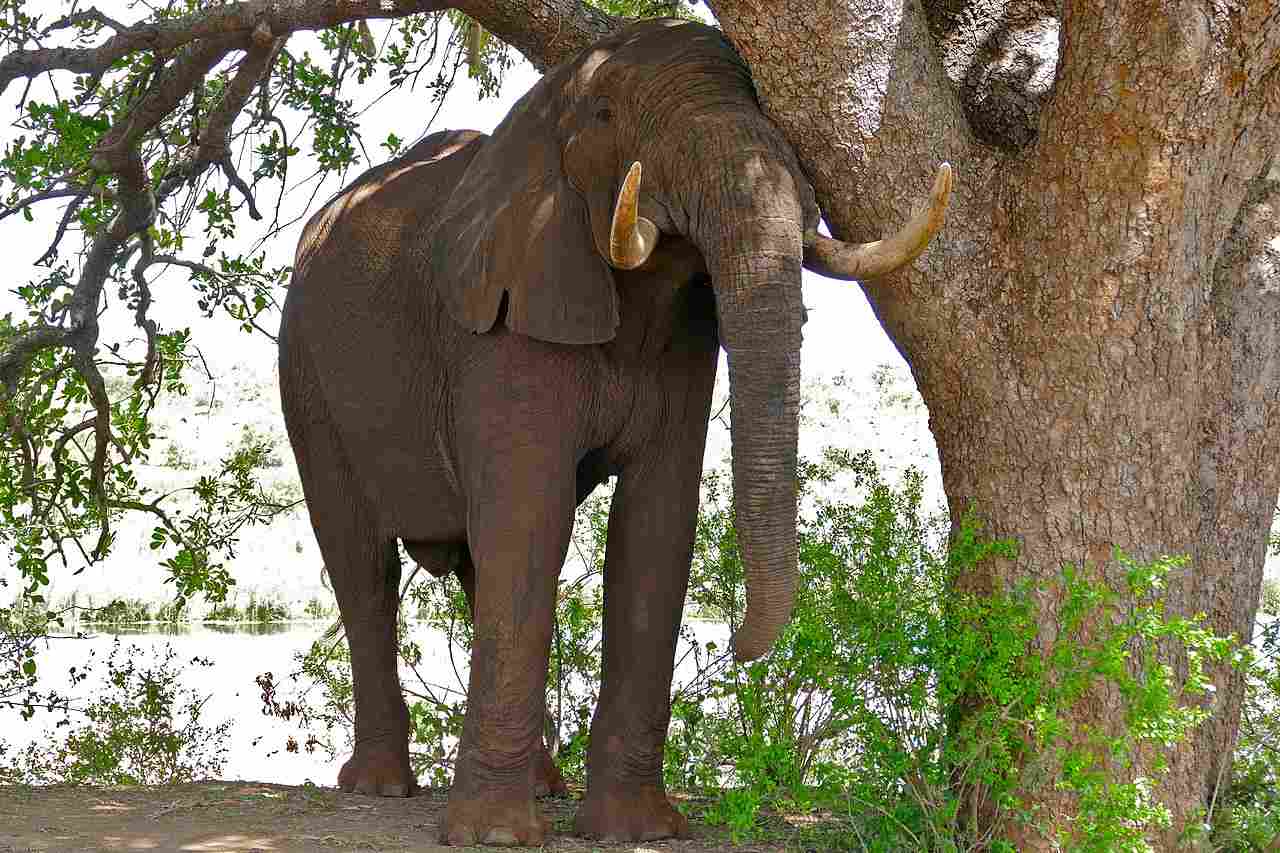
12). Conservation Status
The conservation status of both hippos and elephants is a matter of concern due to the main threats to their survival in the wild. Both animals are facing significant challenges that impact their populations.
Hippos are currently classified as “vulnerable” by the International Union for Conservation of Nature (IUCN). The main threats to their survival include habitat loss and degradation, as well as illegal hunting for their meat and ivory teeth. Human activities such as agriculture, dam construction, and urbanization have resulted in the destruction of their natural habitats, forcing hippos to compete for limited resources. Efforts are being made to protect their habitats and regulate hunting to ensure their long-term survival.
Elephants, on the other hand, are classified as “endangered” by the IUCN. They face similar threats to hippos, including habitat loss and fragmentation, as well as poaching for their ivory tusks. The demand for ivory in illegal markets continues to drive the illegal killing of elephants, leading to a decline in their populations. Conservation organizations and governments are working together to combat poaching, strengthen anti-trafficking measures, and establish protected areas for elephants to thrive.
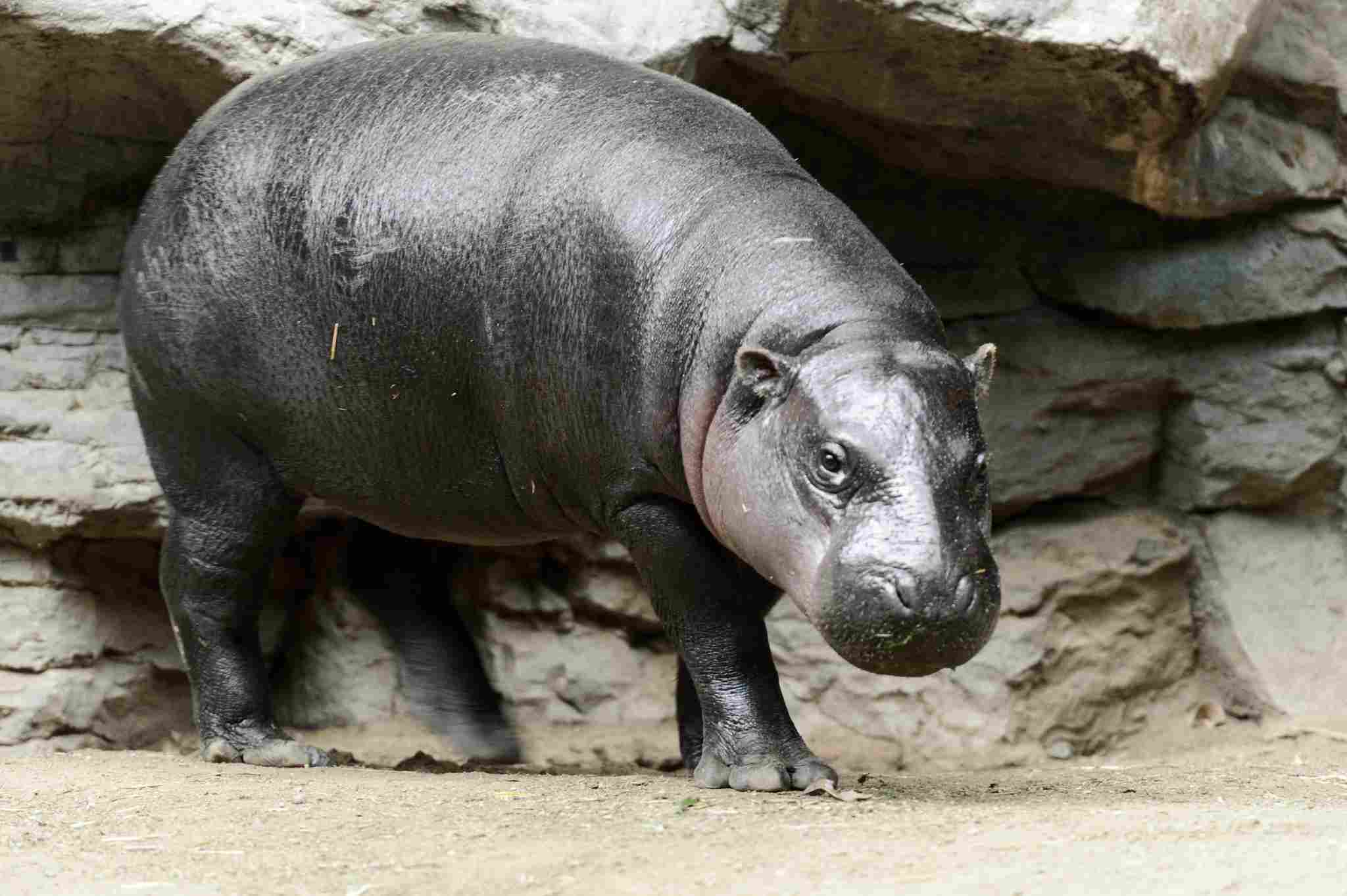
Conclusion
While hippos and elephants share some similarities, they also have significant differences that set them apart.
I). SIMILARITIES
Both hippos and elephants are large, herbivorous mammals that play important roles in their respective ecosystems. They are both social animals, living in groups and exhibiting complex social behaviors. Additionally, both species face similar threats to their survival, including habitat loss and illegal hunting for their valuable body parts.
II). DIFFERENCES
Despite these similarities, there are notable differences between hippos and elephants. Size and weight are one of the key distinctions, with elephants being much larger and heavier than hippos. Elephants also possess a remarkable physical capability, including their ability to use their trunks for various tasks and their immense strength. On the other hand, hippos are known for their powerful bite force, which is one of the strongest among land animals.
In terms of habitat, hippos are primarily found in freshwater environments such as rivers and lakes, while elephants inhabit a range of habitats including forests, grasslands, and savannas. Lifespan and reproductive behaviors also differ, with hippos having a shorter lifespan and elephants having a longer gestation period and slower reproductive rate.
